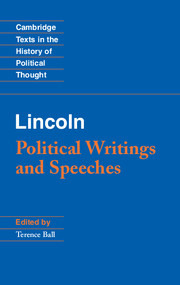Book contents
- Frontmatter
- Contents
- Preface
- Introduction
- Chronology
- Biographical synopses
- A note on sources and abbreviations
- Bibliographical note
- I Political Writings and Speeches
- 1 Autobiographical sketch
- 2 “The Perpetuation of Our Political Institutions”
- 3 Limits of Presidential Power
- 4 Speech on the Kansas–Nebraska Act
- 5 To Joshua F. Speed
- 6 Speech on the Dred Scott Decision
- 7 “A House Divided” Speech
- 8 Portion of a Speech at Edwardsville, Illinois
- 9 Seventh Lincoln–Douglas Debate
- 10 On Thomas Jefferson
- 11 Cooper Union Address
- 12 Speech at Indianapolis, Indiana
- 13 Speech at Independence Hall, Philadelphia, Pennsylvania
- 14 First Inaugural Address
- 15 Message to Congress in Special Session
- 16 Appeal to Border-State Representatives for Compensated Emancipation
- 17 Address on Colonization to a Committee of Colored Men
- 18 To Horace Greeley
- 19 Preliminary Emancipation Proclamation
- 20 Proclamation Suspending the Writ of Habeas Corpus
- 21 Second Annual Message to Congress
- 22 Final Emancipation Proclamation
- 23 To General John A. McClernand
- 24 To Erastus Corning and Others
- 25 To Matthew Birchard and Others
- 26 To James C. Conkling
- 27 The Gettysburg Address
- 28 Third Annual Message to Congress
- 29 Proclamation of Amnesty and Reconstruction
- 30 Reply to the New York Working-men’s Democratic Republican Association
- 31 To Albert G. Hodges
- 32 To Charles D. Robinson
- 33 Reply to a Southern Woman
- 34 “With Malice toward None”
- 35 Speech on Reconstruction
- II Notes and Fragments
- Index
23 - To General John A. McClernand
Published online by Cambridge University Press: 05 April 2013
- Frontmatter
- Contents
- Preface
- Introduction
- Chronology
- Biographical synopses
- A note on sources and abbreviations
- Bibliographical note
- I Political Writings and Speeches
- 1 Autobiographical sketch
- 2 “The Perpetuation of Our Political Institutions”
- 3 Limits of Presidential Power
- 4 Speech on the Kansas–Nebraska Act
- 5 To Joshua F. Speed
- 6 Speech on the Dred Scott Decision
- 7 “A House Divided” Speech
- 8 Portion of a Speech at Edwardsville, Illinois
- 9 Seventh Lincoln–Douglas Debate
- 10 On Thomas Jefferson
- 11 Cooper Union Address
- 12 Speech at Indianapolis, Indiana
- 13 Speech at Independence Hall, Philadelphia, Pennsylvania
- 14 First Inaugural Address
- 15 Message to Congress in Special Session
- 16 Appeal to Border-State Representatives for Compensated Emancipation
- 17 Address on Colonization to a Committee of Colored Men
- 18 To Horace Greeley
- 19 Preliminary Emancipation Proclamation
- 20 Proclamation Suspending the Writ of Habeas Corpus
- 21 Second Annual Message to Congress
- 22 Final Emancipation Proclamation
- 23 To General John A. McClernand
- 24 To Erastus Corning and Others
- 25 To Matthew Birchard and Others
- 26 To James C. Conkling
- 27 The Gettysburg Address
- 28 Third Annual Message to Congress
- 29 Proclamation of Amnesty and Reconstruction
- 30 Reply to the New York Working-men’s Democratic Republican Association
- 31 To Albert G. Hodges
- 32 To Charles D. Robinson
- 33 Reply to a Southern Woman
- 34 “With Malice toward None”
- 35 Speech on Reconstruction
- II Notes and Fragments
- Index
Summary
In this letter to General McClernand Lincoln restates his policy on emancipation and his view that the president alone has the authority to emancipate slaves in enemy territory.
Major General MeClernand
Executive Mansion,
Washington
January 8, 1863
My dear Sir
Your interesting communication by the hand of Major Scates is received. I never did ask more, nor ever was willing to accept less, than for all the States, and the people thereof, to take and hold their places, and their rights, in the Union, under the Constitution of the United States. For this alone have I felt authorized to struggle; and I seek neither more nor less now. Still, to use a coarse, but an expressive figure, broken eggs cannot be mended. I have issued the Emancipation Proclamation, and I cannot retract it.
After the commencement of hostilities I struggled nearly a year and a half to get along without touching the “institution”; and when finally I conditionally determined to touch it, I gave a hundred days’ fair notice of my purpose, to all the States and people, within which time they could have turned it wholly aside, by simply again becoming good citizens of the United States. They chose to disregard it, and I made the peremptory proclamation on what appeared to me to be a military necessity. And being made, it must stand. As to the States not included in it, of course they can have their rights in the Union as of old. Even the people of the states included, if they choose, need not to be hurt by it. Let them adopt systems of apprenticeship for the colored people, conforming substantially to the most approved plans of gradual emancipation; and, with the aid they can have from the general government, they may be nearly as well off, in this respect, as if the present trouble had not occurred, and much better off than they can possibly be if the contest continues persistently.
. . .
- Type
- Chapter
- Information
- LincolnPolitical Writings and Speeches, pp. 170 - 171Publisher: Cambridge University PressPrint publication year: 2012



